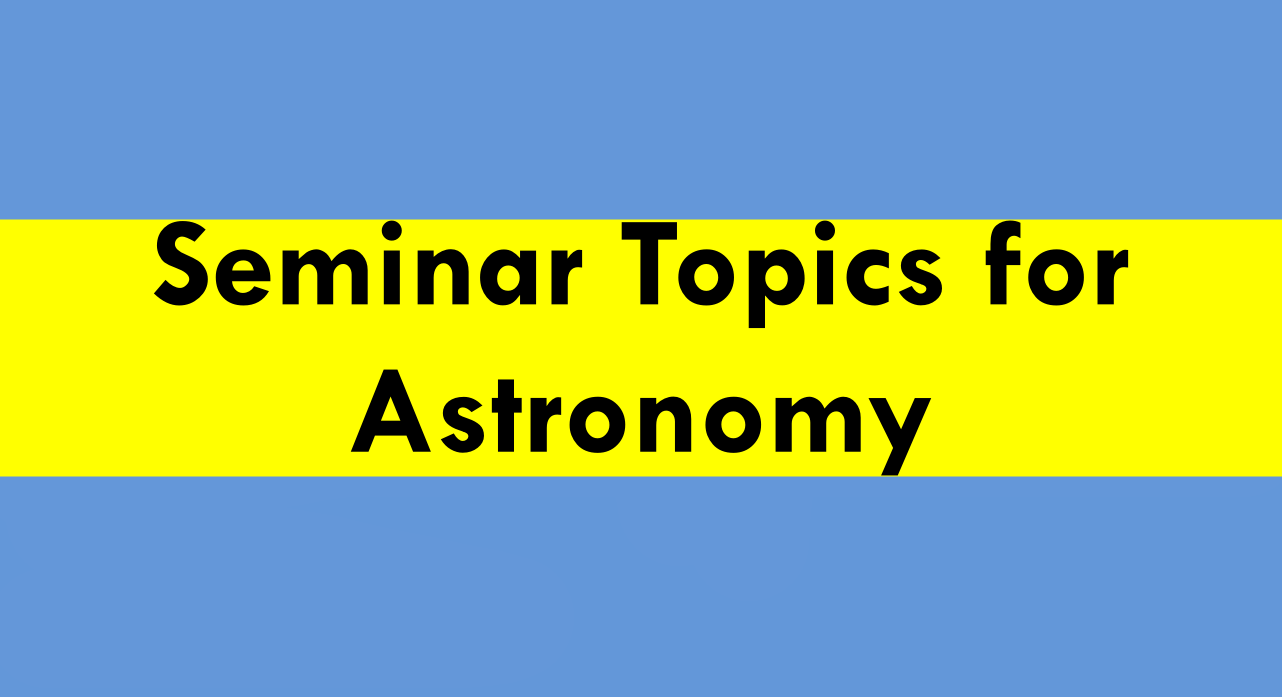
118 Seminar Topics For Astronomy | Astronomy is the study of all things in the universe beyond the atmosphere of Earth. We can also see objects with our naked eyes, such as the Moon, the Sun, and the planets. astrophysics seminar
100 Seminar Topics For Solar Energy
118 Seminar Topics For Astronomy
The evolution of the universe
The search for exoplanets
Black holes and their mysteries
The formation of stars and galaxies
The role of dark matter in the universe
The big bang theory and its implications
The search for intelligent life in the universe
The origin of cosmic rays
The study of gamma-ray bursts
The history of astronomy and its impact on society
The role of women in astronomy
The use of telescopes in astronomy
The study of the interstellar medium
The science behind gravitational waves
The study of planetary systems
The study of asteroids and comets
The study of the sun and its impact on the Earth
The search for dark energy
The study of cosmic magnetic fields
The science behind supernovae
The study of cosmic dust
The study of cosmic rays
The role of astronomy in space exploration
The study of planetary atmospheres
The study of exoplanetary atmospheres
The study of the cosmic microwave background radiation
The study of galactic structure
The science behind the Aurora Borealis and Aurora Australis
The role of astronomy in navigation
The study of quasars and active galactic nuclei
The search for extrasolar planets using microlensing
The study of gravitational lensing
The science behind cosmic strings and inflation
The study of the early universe
The science behind cosmic rays
The study of the interstellar medium
The study of star formation
The science behind the search for extraterrestrial life
The role of astronomy in the development of cosmology
The study of the Oort cloud and the Kuiper belt
The science behind the search for dark matter
The study of cosmic rays
The science behind gravitational waves and the detection of black holes
The role of astronomy in the study of the early universe
The study of galaxy clusters and superclusters
The science behind the search for interstellar communication
The study of the solar wind and its impact on the Earth
The role of astronomy in the study of the formation of the solar system
The study of the structure of the Milky Way galaxy
The science behind the search for gravitational waves from neutron stars
The study of pulsars
The science behind the search for cosmic neutrinos
The study of the history of the universe
The role of astronomy in the search for life beyond Earth
The study of the cosmic web
The science behind the search for fast radio bursts
The study of the early universe using cosmic microwave background radiation
The role of astronomy in the study of dark energy
The study of galactic archaeology
The science behind the search for the origin of ultra-high energy cosmic rays
The study of the interaction of galaxies and the intergalactic medium
The role of astronomy in the study of the formation and evolution of galaxies
The study of the structure and dynamics of the universe
The science behind the search for the origin of the most energetic particles in the universe
The study of the properties of stars
The role of astronomy in the study of the formation of planets
The study of the structure and evolution of galaxies
The science behind the search for the most distant galaxies
The Search for Extraterrestrial Intelligence (SETI)
The James Webb Space Telescope and its scientific mission
The Kuiper Belt: What it is and what we can learn from it
The future of manned space exploration
The habitable zone and the search for Earth-like exoplanets
Cosmic rays and their impact on life on Earth
The impact of the Sun on the Earth’s climate
The role of dark matter in the formation of galaxies
Black holes and their role in the universe
The formation of the solar system
Asteroids: Threats to Earth and opportunities for space mining
The lifecycle of stars
The role of gravity in the universe
The possibility of time travel and its implications
The fate of the universe: expansion or contraction?
The origin of the Moon
The search for the first stars in the universe
The mysteries of the interstellar medium
The role of supermassive black holes in galaxy formation
The physics of cosmic strings
The search for life on Mars
The use of telescopes and observatories in astronomy
The challenges of building and operating telescopes in space
The role of space-based telescopes in modern astronomy
The impact of light pollution on astronomical observations
The search for intelligent life beyond Earth
The formation and evolution of planetary systems
The impact of comets and asteroids on the early Earth
The study of gamma-ray bursts and their implications
The possibility of wormholes and their impact on space travel
The role of neutrinos in the universe
The mysteries of pulsars and magnetars
The study of cosmic microwave background radiation
The detection and study of exoplanets
The role of dark energy in the universe
The discovery of gravitational waves and its impact on astronomy
The formation and evolution of galaxies
The study of star clusters and their role in galactic evolution
The search for the elusive Planet Nine
The use of artificial intelligence in astronomy
The study of galactic halos and their impact on galaxy formation
The impact of cosmic rays on space travel
The use of gravitational lensing to study distant objects
The role of magnetism in the universe
The study of brown dwarfs and their relation to planets and stars
The possibility of terraforming other planets for human habitation
The role of magnetic fields in star formation
The study of active galactic nuclei and their impact on galaxy evolution
The role of supernovae in the formation of heavy elements
The impact of planetary transits on exoplanet studies.
165 Seminar Topics for Blockchain